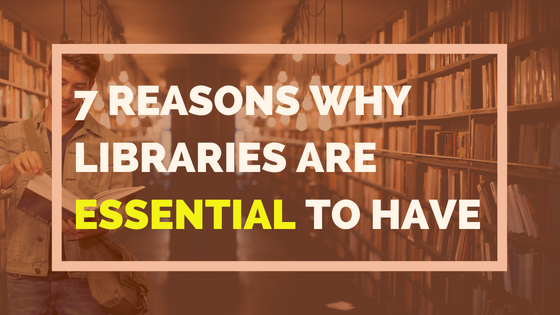In this week’s Princh Library Blog post, we discuss the importance of libraries, and the resources and services they provide to everyone. This blog is an updated version of the original 5 Reasons Why Libraries are Essential to Have post, which you can read here.
These days, when we search for information, it is usually the Google search engine that we use first. However, is that information always trustworthy? As you might know, search engines such as Google tend to provide us with information depending on our formulated questions or keywords, therefore the data we get is not always relevant. Instead, we should lean on libraries.
In this post, you will read about seven concrete reasons why libraries are essential to have and why visitors appreciate them.
Learn the key aspects of Princh! Watch our on-demand demos at your convenience and see what makes Princh such a simple solution. Watch our demos here.
1. Libraries maintain history, and more importantly, truth
Since the ancient Roman Empire, libraries had a purpose to store different kinds of information, such as historical, literary, musical, military documents. Even though in the past 2,000 years many changes, and innovation have occurred, libraries have kept their main purpose to provide visitors with the information they are looking for and be certain about giving the truth. Regardless of the information visitors are looking for, they can easily access it through the help of skilled and well-trained librarians; therefore, librarians have a significant role in public and academic libraries. Generally, their duties include collection-cataloging, development, reference services, building partnerships with educational institutions and providing instructional lecturers to visitors. However, as many communities know, librarians do this and so much more!
“Google can bring you back 100,000 answers. A librarian can bring you back the right one.” – Neil Gaiman
2. Libraries offer free educational resources
Public libraries play an important role in supporting education and literacy. They provide countless resources, such as educational materials, trainings, courses, scientific publications, etc. to visitors. Public libraries provide their services not only face-to-face, but some of them have also integrated e-learning. Furthermore, several published studies confirmed that public libraries had a tremendous importance in every community by providing various services for educational purposes. Nowadays, patrons enter public libraries to find what they will read next, to ask questions about job applications and resume writing or to fill out government forms, including tax and health insurance paperwork. All these questions are answered by highly skilled librarians without any charge.
3. Libraries are sustainable
If you think about the different items that libraries have been offering since they were established and continue to offer to this day, you could say that libraries have always been sustainable. Libraries advocate for the sharing economy by purchasing a limited amount of items that many people can share. For example, people can borrow magazines, books, and even DVDs rather than having to buy their own copies. Additionally, library visitors have full access to shared computers, public printers, meeting rooms, etc. Next time you want to purchase any item from the list above, make sure you check your local library first!
4. Libraries help to build communities
People come to libraries not only looking for information but also to find themselves and their communities. Mothers join baby story-times clubs, elderly people attend events and find ways to connect with people. While teenagers meet up in libraries with their study groups for teambuilding or school projects and readers discuss current events in the periodical’s rooms. In addition, libraries serve as community centers for diverse populations by supporting non-English speakers to help them integrate into the community. Hence, public libraries often collect books in different languages and hire librarians or staff who are multilingual. Furthermore, for artists and art enthusiasts, public libraries can provide a place to arrange exhibitions and to promote themselves. One of the biggest values to be mentioned is that public libraries provide access to the arts for all visitors, normally free of charge.
5. Libraries are transparent with all the services they provide
Privacy is a growing concern in society these days. Data tracking systems that collect, compare and share information might affect consumers’ trust. However, all the services provided in public libraries are focused on consumers and not solely on revenue. That is why libraries do not track your reading history or which trainings you went to. It is simply not in the field of their interest.
6. Libraries contribute to increasing economy
Because libraries are free to use for patrons, people tend to not consider the role they play in the economy. Public libraries provide access to information about business planning, market research and finance opportunities for entrepreneurs who are looking for spaces to network, conduct research, use technology, and arrange meetings. Even though job requirements are changing fast, it is possible to upskill the workforce without spending enormous amounts of money. Technology in libraries can be innovative, offering access to expensive tools, training and skills that otherwise would not be available to everyone.
7. Libraries change lives
We often hear the phrase that libraries change lives. Which, indeed, they do, and they are being recognized for that. For example, there has been an annual Libraries Change Lives Award in the UK. The Award celebrates initiatives that have equality, diversity, and social justice. It has been governed for over 25 years by CILIP and the Community, Diversity and Equality Group (CDEG).
All things considered; libraries play a fundamental role in society. Public libraries provide resources and services for literacy and education to anyone in need or wanting access. They help individuals to expand their network and become a part of a community. As long as people need shared, community-centered spaces that help them find information and connect them with others, it is unlikely for libraries to become irrelevant.
All things considered, libraries play a fundamental role in a society. Public libraries provide resources and services for literacy and education to anyone in need or wanting access. They help individuals to expand their network and become a part of a community. Therefore, peoples’ need for libraries which serve as shared, community-centered spaces that help them find information and connect them with others is unlikely going to change any time soon.

Greta Lastauskaite
Greta is a content writer for the Princh Library Blog. Princh, which is a printing solution designed specifically for and with public libraries, makes a consistent effort to provide advocacy for libraries and library professionals. The Princh blog discusses library specific topics that inform their readers of library trends, insights, technologies and more.
Recent posts
Green Libraries: How Sustainable Design is Shaping the Future of Public Libraries
In this week's Princh Library Blog post, recurring guest writer Sam L. Bowman discusses an ever so important topic: sustainable design and [...]
Librarians Supporting Digital Literacy in the Community
In this week's Princh Library Blog, Nina Grant covers why digital literacy is important, the variety of ways in which librarians are supporting [...]





Leave A Comment